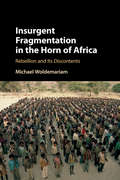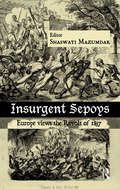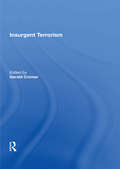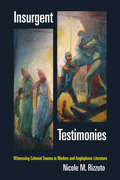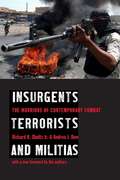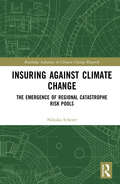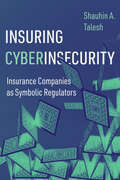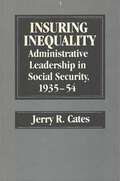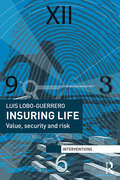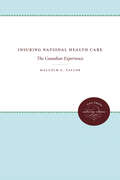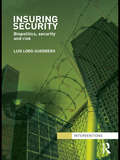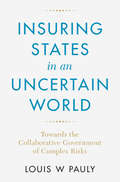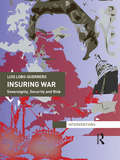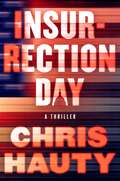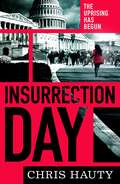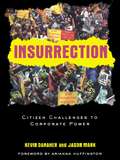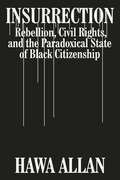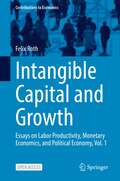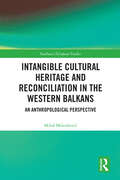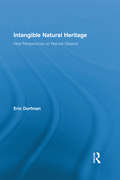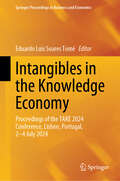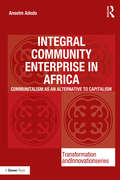- Table View
- List View
Insurgent Fragmentation in the Horn of Africa: Rebellion and its Discontents
by Michael WoldemariamWhen insurgent organizations factionalize and fragment, it can profoundly shape a civil war: its intensity, outcome, and duration. In this extended treatment of this complex and important phenomenon, Michael Woldemariam examines why rebel organizations fragment through a unique historical analysis of the Horn of Africa's civil wars. Central to his view is that rebel factionalism is conditioned by battlefield developments. While fragmentation is caused by territorial gains and losses, counter-intuitively territorial stalemate tends to promote rebel cohesion and is a critical basis for cooperation in war. As a rare effort to examine these issues in the context of the Horn of Africa region, based upon extensive fieldwork, this book will interest both scholarly and non-scholarly audiences interested in insurgent groups and conflict dynamics.
Insurgent Sepoys: Europe Views the Revolt of 1857
by Shaswati MazumdarThe Revolt of 1857 in India has so far largely been viewed as an event that was of interest to British and Indian scholars investigating the various consequences of British colonial rule in India. What has remained out of the focus of study during the last 150 years is the possible impact of the Revolt elsewhere, its so to say international dimension: what, in particular, was the reaction in Europe where elemental social and political transformations were underway. Whatever the varied nature of the reactions, the space given to the Revolt in many European newspapers and journals while it was in progress is certainly extensive. What is more, representations of and reflections on the Revolt appeared both during the event and for long after its suppression, above all in forms of popular fiction but also in historical accounts, letters, reminiscences and other forms of writing. The collection of essays in this volume ventures into this unexplored terrain and offers a first look at some of these European responses.
Insurgent Terrorism (International Library Of Criminology, Criminal Justice And Penology - Second Ser.)
by Gerald CromerTerrorists engage in propaganda and rhetoric, even though they prefer the power of deed over word. They use a wide variety of mechanisms of moral disengagement to convince themselves of the rightness of their actions, a necessary prerequisite for taking up arms. The articles collected together in this excellent volume focus on the rhetoric and propaganda used by insurgent terrorists to justify their resort to violence. The volume includes a thoughtful introduction which summarizes the main findings of the literature, drawing attention to the many different kinds of terrorist propaganda and the underlying similarity between them.
Insurgent Testimonies: Witnessing Colonial Trauma in Modern and Anglophone Literature
by Nicole M. RizzutoDuring the second half of the nineteenth century and the first half of the twentieth, insurgencies erupted in imperial states and colonies around the world, including Britain’s. As Nicole Rizzuto shows, the writings of Ukrainian-born Joseph Conrad, Anglo-Irish Rebecca West, Jamaicans H. G. de Lisser and V. S. Reid, and Kenyan Ng gi wa Thiong’o testify to contested events in colonial modernity in ways that question premises underlying approaches in trauma and memory studies and invite us to reassess divisions and classifications in literary studies that generate such categories as modernist, colonial, postcolonial, national, and world literatures.Departing from tenets of modernist studies and from methods in the field of trauma and memory studies, Rizzuto contends that acute as well as chronic disruptions to imperial and national power and the legal and extra-legal responses they inspired shape the formal practices of literatures from the modernist, colonial, and postcolonial periods.
Insurgents, Terrorists, and Militias: The Warriors of Contemporary Combat
by Richard Shultz Jr. Andrea DewSince the end of the Cold War, conventional militaries and their political leaders have confronted a new, brutal type of warfare in which non-state armed groups use asymmetrical tactics to successfully fight larger, technologically superior forces. In order to prevent future bloodshed and political chaos, it is crucial to understand how these unconventional armed groups think and to adapt to their methods of combat.Richard H. Shultz Jr. and Andrea J. Dew investigate the history and politics of modern asymmetrical warfare. By focusing on four specific hotbeds of instability—Somalia, Chechnya, Afghanistan, and Iraq—Shultz and Dew conduct a careful analysis of tribal culture and the value of clan associations. They examine why these "traditional" or "tribal" warriors fight, how they recruit, where they find sanctuary, and what is behind their strategy. Traveling across two centuries and several continents, Shultz and Dew examine the doctrinal, tactical, and strategic advantages and consider the historical, cultural, and anthropological factors behind the motivation and success of the warriors of contemporary combat.In their provocative argument, Shultz and Dew propose that war in the post-Cold War era cannot be waged through traditional Western methods of combat, especially when friendly states and outside organizations like al-Qaeda serve as powerful allies to the enemy. Thoroughly researched and highly readable, Insurgents, Terrorists, and Militias examines how non-state armies fight, identifies the patterns and trends of their combat, and recommends how conventional militaries can defeat these irregular yet highly effective organizations.
Insurgents, Terrorists, and Militias: The Warriors of Contemporary Combat
by Andrea J. Dew Richard H. Shultz Jr.Since the end of the Cold War, conventional militaries and their political leaders have confronted a new, brutal type of warfare in which non-state armed groups use asymmetrical tactics to successfully fight larger, technologically superior forces. In order to prevent future bloodshed and political chaos, it is crucial to understand how these unconventional armed groups think and to adapt to their methods of combat. Richard H. Shultz Jr. and Andrea J. Dew investigate the history and politics of modern asymmetrical warfare. By focusing on four specific hotbeds of instability-Somalia, Chechnya, Afghanistan, and Iraq-Shultz and Dew conduct a careful analysis of tribal culture and the value of clan associations. They examine why these "traditional" or "tribal" warriors fight, how they recruit, where they find sanctuary, and what is behind their strategy. Traveling across two centuries and several continents, Shultz and Dew examine the doctrinal, tactical, and strategic advantages and consider the historical, cultural, and anthropological factors behind the motivation and success of the warriors of contemporary combat. In their provocative argument, Shultz and Dew propose that war in the post-Cold War era cannot be waged through traditional Western methods of combat, especially when friendly states and outside organizations like al-Qaeda serve as powerful allies to the enemy. Thoroughly researched and highly readable, Insurgents, Terrorists, and Militias examines how non-state armies fight, identifies the patterns and trends of their combat, and recommends how conventional militaries can defeat these irregular yet highly effective organizations.
Insuring Against Climate Change: The Emergence of Regional Catastrophe Risk Pools (Routledge Advances in Climate Change Research)
by Nikolas SchererThis book provides one of the first systematic in-depth studies on regional catastrophe risk pools. It explores the various goals of these new financial instruments, illustrating how they function on a conceptual, technical and practical level, and reconstructs their political genesis. With climate-related disasters increasing in frequency and severity, Insuring Against Climate Change explores how affected countries, especially those in the Global South, have increasingly turned to innovative index insurance instruments, as demonstrated by the creation of the Caribbean Catastrophic Risk Insurance Facility (CCRIF), the African Risk Capacity (ARC) and the Pacific Catastrophe Risk Assessment and Financing Initiative Facility (PCRAFI Facility). Scherer scrutinizes the formation of this trend, exploring comparatively the goals, characteristics and histories of these tools, and argues that their attractiveness rests more on political than economic benefits and is, in fact, more supply than demand-driven. Making a significant contribution to current debates on the opportunities and limitations of what are sometimes described as indirect ‘climate risk insurance’, this book will be of great interest to political scientists with an interest in insurance instruments and climate-related disaster management politics as well as to practitioners working in the insurance, finance and the development sectors.
Insuring Cyberinsecurity: Insurance Companies as Symbolic Regulators
by Shauhin A. TaleshA free ebook version of this title is available through Luminos, University of California Press’s Open Access publishing program. Visit www.luminosoa.org to learn more. Despite the massive costs associated with data breaches, ransomware, viruses, and cyberattacks, most organizations remain thoroughly unprepared to safeguard consumer data. Over the past two decades, the insurance industry has begun offering cyber insurance to help organizations manage cybersecurity and privacy law compliance, while also offering risk management services as part of their insurance packages. These insurers have thus effectively evolved into de facto regulators—yet at the same time, they have failed to effectively curtail cybersecurity breaches. Drawing from interviews, observations, and extensive content analysis of the cyber insurance industry, this book reveals how cyber insurers' risk management services convey legitimacy to the public and to insureds but fall short of actually improving data security, rendering them largely symbolic. Speaking directly to broader debates on regulatory delegation to nonstate actors, Shauhin A. Talesh proposes a new institutional theory of insurance to explain how insurers shape the content and meaning of privacy law and cybersecurity compliance, offering policy recommendations for how insurers and governments can work together to improve cybersecurity and foster greater algorithmic justice.
Insuring Inequality: Administrative Leadership in Social Security, 1935-54
by Jerry R. CatesThe establishment of the Social Security Board in 1935 confronted administrators and policy makers with basic value decisions. Should the system serve to raise the incomes of America's neediest citizens? Or did that aim smack too much of the ideology of redistribution of wealth? Would it rob workers of incentives to provide for their own futures and reward idleness? The conflict of values was played out on a political stage marked by infighting, deception, and short-sighted compromise. The result is the social security system we know today— one that benefits those who need it least, and one that is in a perpetual state of financial difficulty. Insuring Inequality is a penetrating analysis and indictment of that bureaucracy which felt the welfare of America's aged was an acceptable price to pay for the preservation of an ideologically correct social insurance system— a system that would not seriously challenge income inequality in America. Previously unresearched documents not only reveal that social insurance discriminates against the poor and this was a foreseen, intended consequence; but they also reveal that the leaders predicted a financially troubled system and did little to prevent it.
Insuring Life: Value, Security and Risk (Interventions)
by Luis Lobo-GuerreroThis book is a contribution to the scholarly engagement with the wider problem of governing through risk and the politics of uncertainty. It takes life insurance as an empirical site from which to ask: what is the kind of governance created through insurance an instance of, and how does it contribute to the transcendence of liberalism? By making a distinction between capable life as object of insurance, and potential life as that which escapes its control, the book conducts a historical epistemological analysis of the problems of valuation, truth production, securitisation, classification, and gendering that constitute life insurance products and practices. Insuring Life offers a critical engagement with the epistemology of life insurance to demonstrate the unnecessary and precarious character of the conditions that make this instrument of liberal governance possible. It concludes that the transcendence of liberalism relies on the technological agency of these instruments and that its challenge begins by redefining the terms under which the potential of life, if invaluable, is to be thought as event. The book follows Insuring War as the third of a trilogy that analyses how concepts and practices of power, risk and security materialise in the form of insurance as a central instrument of governance in the liberal world. It will be of great use to scholars, researchers, and postgraduate students of political economy, critical security studies and political theory, the biopolitics of security and post-structural politics. Insuring War: https://www.routledge.com/products/search?keywords=insuring+war Insuring Security: https://www.routledge.com/Insuring-Security-Biopolitics-security-and-risk/Lobo-Guerrero/p/book/9780415522854
Insuring National Health Care: The Canadian Experience
by Malcolm G. TaylorTaylor gives a brief history, geared specifically to an American audience, of the evolution of the Canadian national health insurance system from the 1940s to the late 1980s. He describes the two Canadian programs -- hospital insurance and medical insurance -- and discusses the major changes in the programs since they were implemented.Originally published in 1990.A UNC Press Enduring Edition -- UNC Press Enduring Editions use the latest in digital technology to make available again books from our distinguished backlist that were previously out of print. These editions are published unaltered from the original, and are presented in affordable paperback formats, bringing readers both historical and cultural value.
Insuring Security: Biopolitics, security and risk (Interventions)
by Luis Lobo-GuerreroInsurance is the world’s largest economic industry, providing a form of security that more than triples global defence expenditure. However, little is know about the form of security insurance provides. This book offers a genealogical interrogation of the relationship between security and risk through its materialisation in insurance. This work seeks to argue that insurance practices ascribe value to life and in so doing produce a form of security central to the understanding of contemporary liberal governance and security. Lobo-Guerrero theorizes insurance as a biopolitical effect that results from the continuous interaction of an ‘entrepreneurial form of power’, and traditional forms of sovereign security. Through rich empirical cases and a unique theorization, the book breaks apart the traditional division between security studies, political economy and political theory. The author explores this theory in relation to specific issues such as the use of life insurance in the molecular age, the use of insurance to securitize against environmental catastrophic risk, specialist products such as kidnap and ransom insurance, as well as the use of insurance to counter maritime piracy in the twenty-first century. Providing an important and original contribution to the study of the biopolitics of security, this work will be of great interest to all scholars of security studies, international relations and international political economy. Insuring War: https://www.routledge.com/products/search?keywords=insuring+war Insuring Life: https://www.routledge.com/Insuring-Life-Value-Security-and-Risk/Lobo-Guerrero/p/book/9780415716079
Insuring States in an Uncertain World: Towards the Collaborative Government of Complex Risks
by Louis W. PaulyOf the sectors comprising international capital markets, insurance and reinsurance have attracted relatively little attention from students of politics. New social conventions and financial instruments arising from the invention of probabilistic calculation and the discovery of risk began to spread around the world five centuries ago. Today, states and firms are harnessing the logic of insurance to address an expansive array of risks confronting their societies. In Insuring States in an Uncertain World, Louis Pauly examines the history and politics of pragmatic experiments aimed at governing complex global risks. His fascinating and accessible narrative explores the promise and the challenges of multi-faceted insurance arrangements in arenas ranging from nuclear energy production and international financial intermediation to those focused on environmental change, infectious diseases, and disruptive new technologies. At a time when the foundations of global order are under mounting stress, Pauly makes the case for limited and effective political innovation.
Insuring War: Sovereignty, Security and Risk (Interventions)
by Luis Lobo-GuerreroInsurance is a central, if until now ignored, instrument of war in the modern period. Ever since the eighteenth century, interaction between governments and insurers in Western countries has materialised in the form of war risk schemes that have contributed to the waging of war and the preservation of peace. The operation of those schemes has given rise to a curious, if not innocent, association between practices of statehood and practices of risk, which are theorised here under the label of ‘insurantial sovereignty’. The book draws on the British experience of using maritime insurance as an instrument of war during the Napoleonic Wars, the two World Wars, and the early twenty-first century. It asks, what happens, when, under conditions of war, the sovereign adopts insurantial imaginaries and practices into its rationalities of government? In doing so the book makes a novel contribution to the understanding of liberal security and liberal governance which is central to the theory of Political Science and International Relations, the understanding of international political sociology, and international political economy. The book follows Insuring Security: Biopolitics, Security and Risk as the second of a trilogy that analyses how concepts and practices of power, risk and security materialise in the form of insurance as a central instrument of governance in the liberal world. Insuring Security: https://www.routledge.com/Insuring-Security-Biopolitics-security-and-risk/Lobo-Guerrero/p/book/9780415522854 Insuring Life: https://www.routledge.com/Insuring-Life-Value-Security-and-Risk/Lobo-Guerrero/p/book/9780415716079
Insurrection Day: A Thriller
by Chris HautyThe nationally bestselling &“twisty, electrifying&” (Karin Slaughter, #1 international bestselling author) Hayley Chill series continues with this novella following the former Washington, DC, intern as she faces a violent uprising at the United States Capitol. During the course of one terrifying and chaotic day, nativist forces stage a violent uprising by storming the Capitol. Authorities are unprepared to protect the nation&’s elected representatives as the country&’s citadel of democracy is breached in what appears to be a spontaneous insurrection. Hayley Chill, in the building for other business, does what she can to rescue a powerful senator and his staff. But in doing so, she discovers shocking evidence that the uprising had its beginnings with one of the country&’s long-standing overseas enemies. With no one else to trust, Hayley must prevent as many deaths as possible while also chasing down foreign operatives across the city before they abscond with what she understands to be critical national intelligence.
Insurrection Day: The gripping new Hayley Chill novella
by Chris HautyTHE UPRISING HAS BEGUN Hayley Chill has twenty-four hours to stop a violent revolt. The insurrection, taking the form of a storming of the Capitol Building, appears to be wholly spontaneous and disorganized. But is it? As the situation spirals out of control, authorities on the ground are utterly unprepared to protect the nation's elected representatives from the crowd's vengeance. When Hayley Chill rescues a powerful senator and his staff from the mob&’s clutches, she discovers shocking evidence that the uprising is led by one of the country&’s longstanding adversaries. Non-stop action shifts from Capitol Hill to a pursuit across Washington DC as Hayley chases down foreign operatives to make them answer for their crimes. Partly inspired by true events, this is a blistering novella featuring much-loved series character, Hayley Chill, and her fight against the powerful forces that threaten to overthrow democracy. Praise for Chris Hauty 'Hayley Chill is relentlessly smart and brave in this twisty, electrifying thriller' KARIN SLAUGHTER 'Full of twists, this one will keep you hooked to the very end' JAMES SWALLOW 'One of the most surprising double-reverse plot twists I have seen in some time' NEW YORK TIMES &‘Brilliantly fast-moving and absorbing&’ SUNDAY TIMES CRIME CLUB The HAYLEY CHILL thriller series #1 DEEP STATE #2 SAVAGE ROAD #3 STORM RISING
Insurrection and Intervention
by Ned DobosDomestic sovereignty (the right of a government not to be resisted by its people) and international sovereignty (the moral immunity from outside intervention) have both been eroded in recent years, but the former to a much greater extent than the latter. An oppressed people's right to fight for liberal democratic reforms in their own country is treated as axiomatic, as the international responses to the revolutions in Tunisia, Egypt and Libya illustrate. But there is a reluctance to accept that foreign intervention is always justified in the same circumstances. Ned Dobos assesses the moral cogency of this double standard and asks whether intervention can be consistently and coherently opposed given our attitudes towards other kinds of political violence. His thought-provoking book will interest a wide range of readers in political philosophy and international relations.
Insurrection: Citizen Challenges to Corporate Power
by Kevin Danaher Jason MarkFrom uncovering major retailers' links to sweatshop abuses and revealing the deception of American tobacco companies, to questioning corporations' ties to repressive dictators, shaming food processors into selling dolphin-safe tuna and demanding that businesses stop destroying old growth forests, citizens have become far more aggressive in directly
Insurrection: Rebellion, Civil Rights, And The Paradoxical State Of Black Citizenship
by Hawa AllanA brilliant debut by lawyer and critic Hawa Allan on the paradoxical state of black citizenship in the United States. The little-known and under-studied 1807 Insurrection Act was passed to give the president the ability to deploy federal military forces to fend off lawlessness and rebellion, but it soon became much more than the sum of its parts. Its power is integrally linked to the perceived threat of black American equity in what lawyer and critic Hawa Allan demonstrates is a dangerous paradox. While the Act was initially used to repress rebellion against slavery, during Reconstruction it was invoked by President Grant to quell white-supremacist uprisings in the South. During the civil rights movement, it enabled the protection of black students who attended previously segregated educational institutions. Most recently, the Insurrection Act has been the vehicle for presidents to call upon federal troops to suppress so-called “race riots” like those in Los Angeles in 1992, and for them to threaten to do so in other cases of racial justice activism. Yet when the US Capitol was stormed in January 2021, the impulse to restore law and order and counter insurrectionary threats to the republic lay dormant. Allan’s distinctly literary voice underscores her paradigm-shifting reflections on the presence of fear and silence in history and their shadowy impact on the law. Throughout, she draws revealing insight from her own experiences as one of the only black girls in her leafy Long Island suburb, as a black lawyer at a predominantly white firm during a visit from presidential candidate Barack Obama, and as a thinker about the use and misuse of appeals to law and order. Elegant and profound, deeply researched and intensely felt, Insurrection is necessary reading in our reckoning with structural racism, government power, and protest in the United States.
Intangible Capital and Growth: Essays on Labor Productivity, Monetary Economics, and Political Economy, Vol. 1 (Contributions to Economics)
by Felix RothFor several decades now, advanced economies across the globe have been undergoing a process of rapid transformation towards becoming knowledge economies. It is now widely recognized that intangible capital has been a crucial element in the growth performance of these economies and their firms. The term serves as a useful device for capturing those dimensions of capital that are not tangible in nature but are nevertheless fundamentally important for growth. It encompasses investments in education (human capital) and in informal (social capital) and formal (rule of law) institutions by the public sector and households, as well as investments by businesses aimed at enhancing their knowledge base, such as software, innovative property, and economic competencies.Intangible Capital and Growth is the first of two open-access volumes presenting a selection of the author's essays on Labor Productivity, Monetary Economics, and Political Economy. This first volume brings together eight of the author's essays, selected with the aim of providing an overview of his research to date on intangible capital and growth.
Intangible Cultural Heritage and Reconciliation in the Western Balkans: An Anthropological Perspective (ISSN)
by Miloš MilenkovićThis book considers the sensitive heritage elements linked to the very issue of the origins of nations. Beliefs, rituals, and traditional knowledge are examples of intangible cultural heritage (ICH), which communities globally regard as the core of their cultural identity. When it is unclear which element of heritage “belongs” to whom, like in the Western Balkans, where the majority of heritage elements are shared, ICH disputes exacerbate conflict. Its mishandling is especially acute when minority heritage is excluded from governmental cultural policies. With a focus on Serbia, Croatia, Bosnia and Herzegovina, and Montenegro, this book has a global thematic scope, theoretical depth, and policy relevance to the scholars of anthropology and heritage studies as well as to those interested in cultural diversity, human rights, and cultural and educational policies. It will serve as a guide for those who professionally use cultural heritage, or want to start doing so, in the processes of reconciliation, stabilization, and development.
Intangible Natural Heritage: New Perspectives on Natural Objects
by Eric DorfmanThe topic of intangible natural heritage is new, recently emerging as an important subject of inquiry. It describes the untouchable elements of the environment that combine to create natural objects, and help define our relationship to them. These elements can be sensory, like auditory landscapes, or processes like natural selection. As a concept, intangible natural heritage is growing in prominence, as museums are increasingly charged safeguarding and interpreting the milieux from which their objects originate. This book is a significant advance on the subject of intangible natural heritage; no book on the topic has yet been written and current scholarship is confined to a few isolated papers. As such, there exists a wide variety of perspectives on the topic. Intangible Natural Heritage presents a spectrum of opinion, making the first attempt at a unifying concept on which future work can be based. Authors from Europe, Asia, Australasia, Britain, and North America, address topics on scales from minute insects to sweeping landscapes. The common thread in these explorations is the importance of human relationships with nature that is passed down from generation to generation. In a world that is becoming increasingly fragile, recognizing and fostering these relationships has never been more vital.
Intangibles in the Knowledge Economy: Proceedings of the TAKE 2024 Conference, Lisbon, Portugal, 2–4 July 2024 (Springer Proceedings in Business and Economics)
by Eduardo Luis Soares ToméThis book features selected chapters from the proceedings of the Multidisciplinary Conference on Intangibles (TAKE), held in Lisbon, Portugal, in July 2024. The chapters cover a wide range of topics , including human resource development, intellectual capital, knowledge management, logistics, retailing, public policy, innovation and entrepreneurship, business models, competitiveness, and accounting. The book is a valuable resource for researchers, practitioners, and industry experts interested in shaping the future of the knowledge economy.
Integral City: Evolutionary Intelligences for the Human Hive
by Marilyn HamiltonThe original inspiration for this book must come from my father, Jack Douglas Herbert, one of Canada's seminal museum developers. When I was eight, he told me to write about what I know (and of course, now I know my pursuit of knowing is a never-ending quest).
Integral Community Enterprise in Africa: Communitalism as an Alternative to Capitalism (Transformation and Innovation)
by Anselm AdodoAt a time of global economic crisis and disillusionment with capitalism, Adodo offers refreshing and positive insight into a more integral way of business management, enterprise and community development as well as holistic healing in Africa. For over three decades, Africa was the recipient of billions of dollars in aid funds that were meant to catapult the continent from undeveloped to developed status. Yet the more the aid poured in, the poorer African countries became. The devastating effect of western economic models in Africa that followed is well documented. Integral Community Enterprise in Africa exposes the limitations of existing theories, such as capitalism, socialism and communism, and shows how western theories were imposed on Africa. Such imposition of concepts and ideas is not only demeaning but also unsustainable, serving only the interest of the elite. Father Anselm Adodo argues for the need to have a southern theory to serve as an alternative to western theories. The majority of African intellectuals and activists, while criticizing existing theories, often do not provide alternative theories to address the prevalent inadequacies entrenched in conventional social, political and economic systems. This revolutionary book aims to address this lapse and proposes the theory of communitalism as a more indigenous, sustainable and integral approach to tackling the social, political, economic and developmental challenges of today’s Africa. There is an African alternative to capitalism, socialism and communism – a surer path to sustainable development in and from Africa. This is a book that is positioned at the very core of a much needed African Renaissance. A profoundly new approach to development in Africa, this is essential reading for anyone concerned with authentic development in Africa and in the world.
